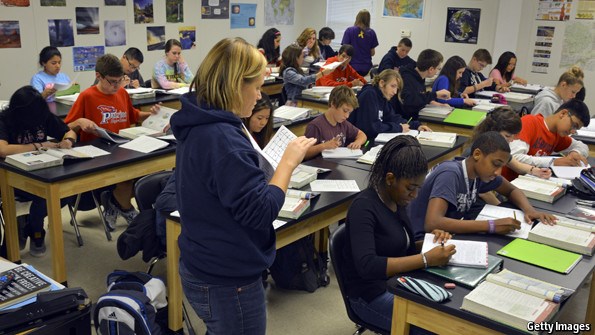
The New York State Board of Regents voted on Tuesday for a five-year delay of the Common Core graduation requirements, a tougher set of education standards first implemented in New York last year.
That means, the class of 2022—this year's fourth-graders—will be the first to face the Common Core requirements for graduation, rather than the class of 2017—this year's ninth-graders.
"Well, I'm sure the majority of high school teachers are very happy now," said one former Brooklyn principal and Clinton Hill resident who preferred not to be named. "But I know there are a handful of teachers who have been preparing for the Common Core and taking it very seriously; they'll probably feel a little bit deflated."
The state's implementation of the Common Core has been widely criticized by students, parents and teachers, for a variety of reasons-- the greatest being that the tests represent an unfair measurement of skills; that many students in New York were not adequately prepared for the material they encountered on the tests; and that there exists, still, a lack of clarity on how it would and should be tied to teacher evaluations.
Critics on the right reject federal meddling in public education. Those on the left worry that the assessments are developmentally inappropriate. Almost all agree that too many "fixes" were still needed. Yet these exams carry high stakes for everyone involved: for students seeking promotion to the next grade and for teachers, principals and schools being evaluated on the data points they generate.

But not everyone is in disagreement with the tests. One Brooklyn resident, Onitara Nelson, whose daughter is in the fourth grade at P.S.11 in Clinton Hill, said she was happy with the Common Core standards and is relieved that requirements will be in place in time for her daughter's graduation.
"It's been pretty rigorous and she's had a lot of homework over the last two years. But I felt at least it was leveling the playing field," Nelson said. "The test has raised the bar on student expectations, and it will have our children ready to compete in the 21st Century with the world."
U.S. Education Secretary Arne Duncan drew complaints late last year when he spoke of critics of the Common Core curriculum: "It's fascinating to me that some of the pushback is coming from, sort of, white suburban moms who—all of a sudden—their child isn't as brilliant as they thought they were and their school isn't quite as good as they thought they were, and that's pretty scary "

Duncan apologized a few days later for what he called his "clumsy phrasing" but stood by his assertion that the dramatically lower test results in states that have introduced the new tests over the past two years represent "a more realistic assessment of students' knowledge and skills" than previous exams and that "every demographic group has room for improvement".
School officials can still use the new education standards in teacher performance evaluations, but educators are currently not able to use Common Core as an excuse for poor ratings.
Gov. Andrew Cuomo, who has been a strong proponent of Common Core standards, expressed frustration with the delay.
"It is inarguable that we have not made the progress we need to make statewide in public education," Cuomo said in a radio interview.
"If you don't have the results, then maybe you say, 'We have to question the way we're providing the service.' "



